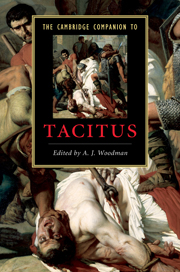Book contents
- Frontmatter
- Introduction
- Part I Contexts
- Part II Texts
- Part III Topics
- 10 Tacitus’ personal voice
- 11 Tacitus as a historian
- 12 Res olim dissociabiles: emperors, senators and liberty
- 13 Style and language
- 14 Speeches in the Histories
- 15 Warfare in the Annals
- Part IV Transmission
- Chronological table
- Abbreviations and bibliography
- Index
13 - Style and language
from Part III - Topics
Published online by Cambridge University Press: 28 March 2010
- Frontmatter
- Introduction
- Part I Contexts
- Part II Texts
- Part III Topics
- 10 Tacitus’ personal voice
- 11 Tacitus as a historian
- 12 Res olim dissociabiles: emperors, senators and liberty
- 13 Style and language
- 14 Speeches in the Histories
- 15 Warfare in the Annals
- Part IV Transmission
- Chronological table
- Abbreviations and bibliography
- Index
Summary
Tacitus' great reputation owes as much to his style as to the content of his writings, the two being fused in notable harmony. Yet the expression 'his style' is potentially misleading. First, just as a well-trained composer can compose in different genres and styles, so a well-trained Latin writer could write in more than one style. Most of this chapter will be devoted to discussion of the historical styles found in the Histories, the Annals and much of the Agricola, but Tacitus' splendid Dialogus is a virtuoso performance in a neo-Ciceronian style that is the equal of anything in Quintilian. Second, even in his historical works Tacitus' style varies: in particular, speeches tend to have more pointed phrasing and less grand vocabulary than narrative. Third, Tacitus' style developed throughout his writing career, becoming more idiosyncratic as it progressed: compared to the later Annals, the earlier Agricola and the Germania are less taut, compressed and solemn. Even the most distinctive of artists owe much to their predecessors and the fashions of the age in which they worked; we shall see that earlier historians, especially Sallust, and the pointed style fashionable in his own times are the dominant influences on Tacitus' historical style.
- Type
- Chapter
- Information
- The Cambridge Companion to Tacitus , pp. 195 - 211Publisher: Cambridge University PressPrint publication year: 2010
- 4
- Cited by

